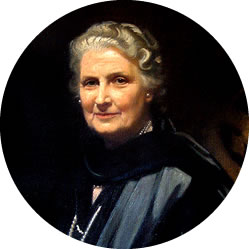
Maria Montessori (1870 – 1952), was the first woman in Italy to receive a medical degree. She worked in the fields of psychiatry, education and anthropology. She believed that each child is born with a unique potential to be revealed, rather than as a “blank slate” waiting to be written upon.
Her main contributions to educating and raising children include:
Preparing the most natural and life supporting environment for the child
Observing the child living freely in this environment
Continually adapting the environment in order that the child may fulfill his greatest potential — physically, mentally, emotionally, and spiritually.
Maria Montessori developed a teaching program that enabled ‘defective’ children to read and write. She sought to teach them skills not solely through repetition, but through working on exercises that prepare them to learn skills. Continuous work on these exercises would then lead them to the skills: Looking becomes reading; touching becomes writing. The success of her method then caused her to ask questions of ‘normal’ education which is proven successful and has worldwide acceptance.
The Montessori Philosophy is an Aid to Life which follows the child’s brain development, physical, mental and emotional needs. It is a comprehensive educational approach from birth to adulthood based on Maria Montessori’s understanding of children’s natural learning tendencies. Children learn about the world by using their hands and all of their senses. Children move freely around the classroom while they experience language, reading, writing, geography, mathematics, science, music, art, history, sensorial perfecting aids, and engaging in practical life activities.
The purpose and aim of Practical Life is to help the child gain control in the coordination of his/her movement, and help the child to gain independence and adapt to society. Practical Life Exercises also aid the growth and development of the child’s intellect and concentration and will in turn help the child develop an orderly way of thinking.
The purpose and aim of Sensorial work is for the child to acquire clear, conscious information and able them to make classifications in their environment. Sensorial exercises enhances every quality that can be perceived by the senses such as size, shape, composition, texture, loudness or softness, matching, weight, temperature, etc.
When the child arrives in the Montessori classroom, the child has fully absorbed his culture’s language. Learning of language is not done through subjects as in a normal classroom, here the child is learning at his own rhythm. The Montessori material plays an important role in aiding the child develop the powers of communication and expression, organization and classification, and the development of thought. The Language curriculum includes pre-reading visual exemplars in the form of cards that helps every child understand other individuals, express personal thoughts and opinions as well as demonstrate growth in other curricular areas.
Math is all around the young child from day one. Little children are naturally attracted to the science of numbers. Mathematics, like language, is the product of the human intellect. The Math curriculum includes a variety of counting, number recognition as well as symbol and quantity matching exercises. Children progress to understand mathematical concepts using simple materials and eventually advancing towards more complex manipulatives that expand their exploration of shape, size, symbol, and quantity.
Montessori saw that young children were interested in exploring the environment in increasingly complex ways. The Cultural area of the Montessori classroom covers a variety of subjects. Geography, Science, Botany, Zoology and History. Students are exposed to rhythm, songs, dance and movement. Every child participates in various art projects that reflect classroom themes, cultural celebrations and festive holidays.
The Montessori environment is created to fulfill your child’s academic, mental, physical, emotional and social needs. On successful completion of the program, your child will develop the following qualities:
Memory and co-ordinated movement
Concentration
Spoken language
Increased knowledge and vocabulary
Logical thinking
Self-awareness, Self- confidence & Self discipline
Patience
Obedience
Perseverance
Emotional wellness and competencies.